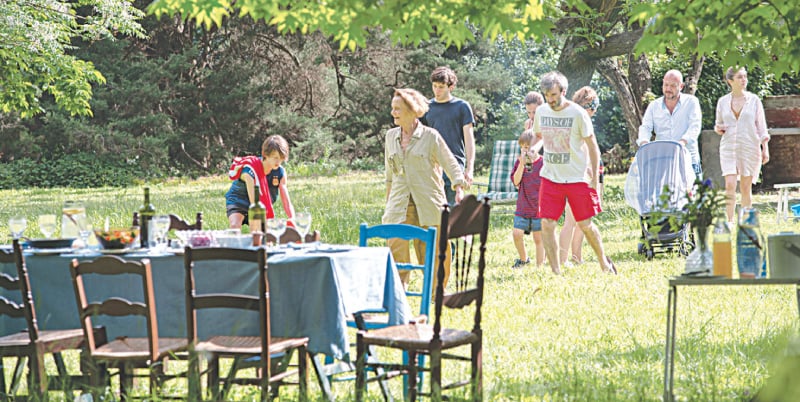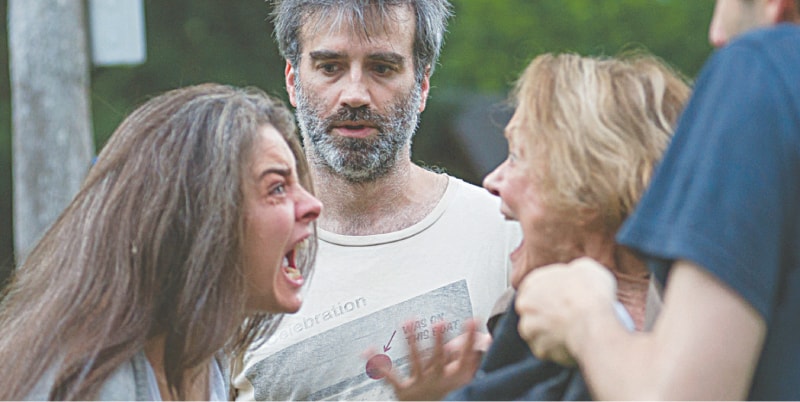
The Argentine drama The Sleepwalkers opens to a powerful image. A mother jolting out of sleep, searching for her daughter. She scans the loo and different parts of the house, finally finding her in the living room: an impassive face, a naked body, blood lining her lower legs.
The mother, Luisa (Erica Rivas), is worried about her teenage daughter, Ana (Ornella D’Elía), for two reasons: She’s recently started her period, and she’s a habitual sleepwalker. Luisa knows that this world is unsafe for young girls — especially for her child, who is not in control of her body, even when she’s sleeping.
This drama is the story of a mother and a daughter, as well as the story of families: Luisa’s own and her in-laws’. Before the New Year, she, her husband Emilio (Luis Ziembrowski), and Ana visit her mother-in-law, Memé (Marilú Marini), at her countryside cottage. Also present are the families of Emilio’s brother Sergio (Daniel Hendler) and sister Inés (Valeria Lois). They’ve met after long, and time has nurtured their festering wounds and latent desires, giving them new identities.
The Argentinian drama The Sleepwalkers has intriguing subplots but they don’t quite produce a unified meaning
A family is usually supposed to be a comforting haven but, in The Sleepwalkers, the animals don’t live in the jungles, they eat at the dining table, share drinks, crack jokes. And in this world, where it’s impossible to differentiate between friends and foes, Luisa has a daughter who sleepwalks at night.

But Ana isn’t the only one. It is later revealed that Memé, too, is a somnambulist. So is Luisa. This family, like many others, has inherited anxieties and disorders. There are other hints of duality binding the mother and daughter. In an early scene, they’re filmed side by side, changing clothes, with just their legs visible. At the family cottage, the house help tells Luisa that, “She [Ana] is just like you.” Ana is attracted to her cousin, Sergio’s son, Alejo (Rafael Federman), a charismatic yet mysterious young man. The same Alejo, during a car ride, tries to make Luisa uncomfortable.
Paula Hernández, The Sleepwalkers’ director, allows her story to find its rhythm. The conflicts aren’t too apparent or pressing. Like a typical family vacation, many scenes have a veneer of geniality and banter. And even when the story opens, it does so lightly, showing how an innocuous event can induce tremors in the family.

When Memé, for instance, announces her plan to sell the family house, because it lies unattended for the rest of the year, it results in disagreements among Emilio, Luisa, and Sergio. Even other seemingly small things, such as the discussion about Luisa’s career — she is a translator, Sergio works in publishing — causes fissures between Emilio and her. This family, it’s soon evident, has not addressed their grievances, rather lives with them — and one hard sigh crumbles their castles of sand.
The movie’s visual style echoes its themes. The camera stays close to the characters, suffocating them for space. The framing is quite unconventional — people are often shot from a side angle, heightening the feeling of distortion. The jerky hand-held cameras make the unit more chaotic.

But if the cinematography is generous — revealing details — then the screenwriting is miserly, dropping just enough information for the plot to chug along. If that narrative style helps build intrigue about this family then, after a point, it also starts to frustrate. The film tackles several subplots and, yet, the film lacks a central propulsive force, prompting you to wonder, “What is the story?”
If this is a story about a fractured mother-daughter relationship — and how their individual desires are stifled by familial pressure — then that bond isn’t explored in depth. If this is a story about a crumbling marriage — because the partners withhold secrets — then we don’t see its vast sweep to register that disintegration.
If this is a story about the threats to female adolescence — heightened by feelings of confusion and naïveté — then the centrepiece of that investigation, Ana, remains relatively inert. Perhaps it’s a film about all these things, spun around the collision between fragile adolescence and warped notions of masculinity, but Hernández doesn’t zoom her gaze enough.

Several subplots lie in varying degrees of suspension — we get a fascinating exchange here, some revealing information there — so their elements don’t coalesce together to form a powerful whole.
Further, the links among the subplots aren’t strong enough to produce a unified meaning. The story, as a result, frequently meanders, often snapping our points of engagement.
The Sleepwalkers ends on a horrifying note — a climactic gut-punch. That revelation is as discomfiting as the realisation that it doesn’t feel too surprising, a commentary on the ubiquity of evil. It’s a good enough film to earn that shock. But it would have been better had it spent more time dissecting that evil, instead of just depicting it. — By arrangement with The Wire
Published in Dawn, ICON, January 31st, 2021














































Dear visitor, the comments section is undergoing an overhaul and will return soon.